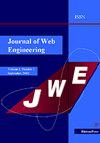TrADS:一个具有信任意识的去中心化社会网络
IF 1
4区 计算机科学
Q4 COMPUTER SCIENCE, SOFTWARE ENGINEERING
引用次数: 0
摘要
在当今数据驱动的世界中,人们越来越重视数据隐私和控制。这种意识引发了去中心化网络的倡议,其中网络应用程序不再依赖于集中的数据存储。Solid是去中心化网络的一种突出方法,它允许用户将数据存储在他们控制的去中心化pod中。但是,集成来自各种可能不受信任的来源的数据可能导致恶意或有害的结果,并损害用户体验。为了解决社交网络的这个问题,我们提出了一个名为TrADS的信任感知和分散的web应用程序。它利用MVC模式基于信任评估集成来自Solid pods的外部数据。在这篇文章中,我们扩展了第一篇关于贸易贸易的论文,进一步详细介绍了相关工作的评估、概念和实施。我们还将我们的评估扩展到另一个有64名参与者的国际用户研究。我们衡量用户体验而不是纯粹的可用性,并形成两组独立的参与者,其中一组体验TrADS的信任意识,另一组没有。结果还没有显示出用户体验的显著改善,但表明在社交网络中使用信任意识后,用户更喜欢具有此类功能的网络。本文章由计算机程序翻译,如有差异,请以英文原文为准。
TrADS: A Trust-Aware Decentralized Social Network
In today's data-driven world, people are increasingly prioritising data privacy and control. This awareness has sparked an initiative for a decentralized web, where web applications no longer rely on centralized data storage. Solid, a prominent approach for a decentralized web, allows users to store their data in decentralized pods of their control. However, the integration of data from various and potentially untrusted sources can lead to malicious or harmful results and impair user experience. To solve this problem for social networks, we propose a trustaware and decentralized web application called TrADS. It utilises the MVC pattern to integrate external data from Solid pods based on trust evaluations. In this article, we extend our first paper on TrADS with further details on related work assessment, concept and implementation. We are also extending our evaluation to a second international user study with another 64 participants. We measure the user experience instead of pure usability and form two separate groups of participants, one of which experiences the trust awareness of TrADS and one of which does not. The results do not yet show significant improvement in the user experience but show that after using trust awareness in a social network, users favour a network with such features.
求助全文
通过发布文献求助,成功后即可免费获取论文全文。
去求助
来源期刊

Journal of Web Engineering
工程技术-计算机:理论方法
CiteScore
1.80
自引率
12.50%
发文量
62
审稿时长
9 months
期刊介绍:
The World Wide Web and its associated technologies have become a major implementation and delivery platform for a large variety of applications, ranging from simple institutional information Web sites to sophisticated supply-chain management systems, financial applications, e-government, distance learning, and entertainment, among others. Such applications, in addition to their intrinsic functionality, also exhibit the more complex behavior of distributed applications.
 求助内容:
求助内容: 应助结果提醒方式:
应助结果提醒方式:


